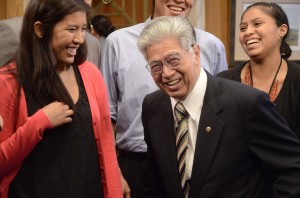
Sen. Daniel Akaka, D-Ill., greets students following the Native CLASS Act hearing on Capitol Hill. (Gabrielle Levy/MNS)
W
ASHINGTON – A new bill aimed at improving public education for Native Americans – and sponsored by both Hawaii senators – received support from American Indian groups this week on Capitol Hill.
The groups said Thursday Native Culture, Language and Access for Success in Schools Bill would improve language and cultural education for American Indian children and increase tribal sovereignty.
Introduced last week by Hawaii Sen. Daniel Akaka, a Democrat, and co-sponsored by the state’s other Sen. Daniel Inouye, and Sen. Tim Johnson, D. S.D., the bill received overwhelmingly positive reaction from the witnesses at its first hearing before the Senate Committee on Indian Affairs.
“The decisions we make today to improved the education system for our young Native people are decisions about how we envision the future of our communities,” said Akaka in his opening statement.
Testimony came from witnesses representing tribes from Massachusetts, South Dakota, Colorado, and Montana. Akaka said students of American Indian descent often have the lowest graduation rate of any other racial group in the U.S.
In Hawaii, nearly 70 percent of schools where more than half the students are native Hawaiian failed to meet the adequate yearly progress benchmark for achievement, a tenet of the No Child Left Behind regulation for student improvement, compared to just 55 percent of schools with a minority of native Hawaiians.
According to the National Center for Education Statistics, in 2008, American Indian and Alaska Native students had a 14.6 percent dropout rate, nearly twice the national average. Amy Bower, an attorney for the Native American Rights Fund, testified that these numbers are linked to unemployment, drug and alcohol use, teen pregnancies and other social issues that are systematic problems on tribal lands.
Senators questioned the panel on the best ways to coordinate the use of funding and curriculum design to best serve students whose schools often lack the training to address the unique languages and culture of various tribes.
Cedric Cromwell, of the Mashpee Wampanoag Tribe in Massachusetts, said that public intuitions often fail to take advantage of the existing provisions of the Elementary and Secondary Education Acts, which the proposed bill amends, that deal specifically with American Indian youth.
“They are completely unaware around these Title VII monies that should follow our children throughout our school systems,” Cromwell said. Title VII covers bilingual education.
Several witnesses also said it was critical to improve coordination between the Bureau of Indian Affairs, which often coordinates the distribution of funds, the public schools on reservations, and the tribes themselves.
Scott Russell, of the National Congress of American Indians and a member of the Crow Tribe in Montana, lauded some of the work done in Hawaii to integrate native cultures into public schools.
“We have a senator sitting here where the state has set up immersion schools,” Russell said. “This is an opportunity for all of us to come together.”
While this bill is still very early in its legislative process, introduced just a week before the hearing, Akaka emphasized his enthusiasm for the issue.
“As a former educator, this issue is very dear to my heart” Akaka said. “Strong roots and a successful future for our native communities depend on the success of our young people in school.”
